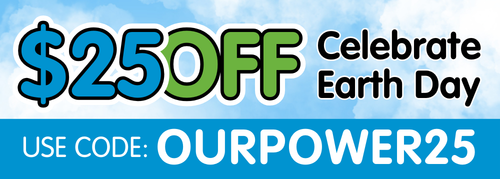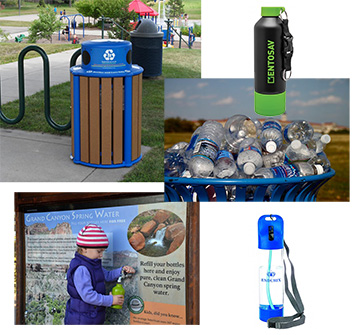Why isn’t there more recycling at local and national parks?
Many national parks have banned the sale of plastic bottles on park lands. Visitors are encouraged to use reusable bottles and refill them at free water-filling stations throughout the parks. Zion National Park in Utah estimates its ban prevents more than 5,000 pounds of plastic bottles ending up in the trash every year.
Unfortunately, plastic bottle bans have been slow to catch on. Only 22 national parks in the country currently have bans. America’s love affair with bottled water can be seen in recycling and, sadly, trash bins at parks big and small across the country.
Spring sports leagues are in full swing right now, and baseball, softball, and soccer fields across the country are bustling with activity. It’s great to see so many participants using reusable water bottles and jugs. It’s also great to see parks with water fountains and recycling containers for bottles and cans. Unfortunately, far too many parks and green spaces do not offer any sort of recycling. Trash cans at these parks are filled with recyclables like plastic water and sports drink bottles.
Vancouver, one of the greenest cities in North America, lacks recycling at its parks according to a study by Langara College students. The biggest hurdle to implementing park recycling programs appears to be the expense coupled with high contamination rates.
While local park districts/boards and even national parks may have budget limitations keeping them from implementing recycling initiatives, park visitors can help make a big difference with small changes:
1. Always bring a reusable water bottle. On hot days, bring more than one. Or bring a reusable two-gallon personalized Coleman water jug. Refill at a water fountain if there is one. Sports teams can even sell custom printed reusable water bottles with their team name for fundraising efforts.
2. Take your trash and recyclables home with you. The number one rule of camping is “Pack it in, pack it out” and the same holds true when visiting parks. If you run out of water and need to buy a bottle of water, take the bottle with you until you can deposit it in a recycling bin.
3. Stop the snack madness and don’t frequent the concession stand. For years, parents and nutritionists have been vocal about the sports snack epidemic in youth sports. Snacks can often outweigh the benefits of activity at local parks. Snacks also create a lot of waste from individual serving size packaging to juice box straw wrappers that frequently end up strewn all over the fields.
According to a survey by Keep America Beautiful, 92 percent of respondents said they recycled at home, but only 19 percent indicated that they typically recycle in public parks. Additional research conducted by Keep America Beautiful indicated only 12 percent of surveyed public locations had recycling infrastructure in place to recover containers. Park districts and forest preserves looking to improve recycling access can apply for The Dr Pepper Snapple Group/Keep America Beautiful Park Recycling Bin Grant to improve recycling access at local parks.
This summer, Eco Promotional Products encourages everyone to make one small change to reduce waste when enjoying the outdoors. Reduce. Reuse. Recycle.
Photo credits: City of St. Anthony, MN, Mr.TinDC/flickr, Grand Canyon National Park/flickr



